
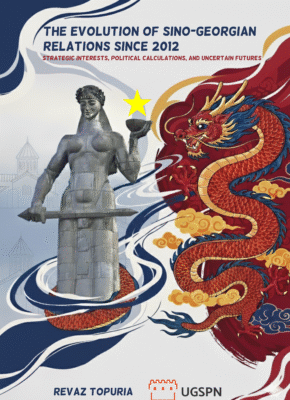 The Evolution of Sino-Georgian Relations Since 2012: Strategic ...
The Evolution of Sino-Georgian Relations Since 2012: Strategic ...
This article provides a comprehensive analysis of the transformation in Sino-Georgian relations since 2012, highlighting how bilateral ties have evolved from limited economic engagement into a formal strategic partnership. It situates this evolution within China’s more assertive foreign policy under Xi Jinping, embodied in the Belt and Road Initiative and Georgia’s strategic recalibration under the Georgian Dream government. The study examines China’s motivations, including logistical access via the Middle Corridor, political diversification in the Black Sea region, and symbolic partnership with a cooperative democracy. It explores Georgia’s calculus in seeking alternative sources of investment, hedging against Western conditionality, and leveraging the relationship for domestic legitimacy. The article then assesses key risks: the asymmetry of power and unmet expectations, the tension between Georgia’s Euro-Atlantic aspirations and deeper ties with China, the waning momentum of the BRI, and the fragility of a pragmatism-based partnership. In conclusion, it argues that without stronger institutional mechanisms and clearer strategic objectives, the Sino-Georgian partnership is likely to remain symbolic rather than transformative, offering cautionary lessons for small-state diplomacy in a multipolar world.
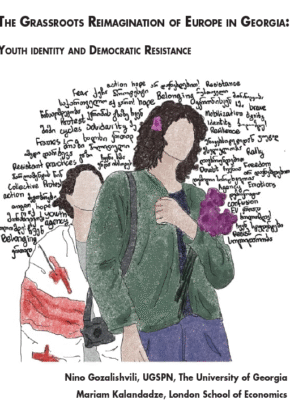 The Grassroots Reimagination of Europe in Georgia: Youth ...
The Grassroots Reimagination of Europe in Georgia: Youth ...
Youth resistance in Georgia has emerged as a key actor within the landscape of non-parliamentary opposition. This paper examines how university students mobilised during the 2024 protests, not simply to contest a piece of legislation, but to engage in broader acts of political redefinition and identity reclamation. Drawing on twenty-eight ethnographic diaries, the paper investigates how emotional, symbolic, and generational practices are deployed by young activists to articulate belonging, citizenship, and resistance outside formal political institutions.
Rather than acting in coordination with the parliamentary opposition, students build their own oppositional identity through emotionally charged practices such as “identity marches,” protest rituals, and symbolic appropriation of public space. These actions reveal how emotions—particularly anger, hope, fear, pride, and confusion—function as more than expressive tools: they structure participation, forge horizontal solidarities, and sustain collective motivation over time.
The analysis highlights how students reinterpret national and European belonging as affective and civic projects, positioning themselves in opposition to both Russian influence and domestic political elites. Their actions suggest a transformation of Europeanisation from a top-down institutional narrative into a lived, grassroots civic identity. This case contributes to broader discussions on how extra-institutional opposition actors generate political agency in post-communist hybrid regimes.
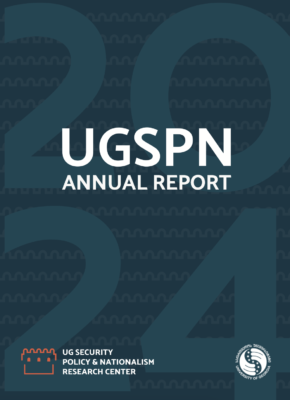 ყოველწლიური ანგარიში 2024
ყოველწლიური ანგარიში 2024
UGSPN-ის ყოველწლიური ანგარიში
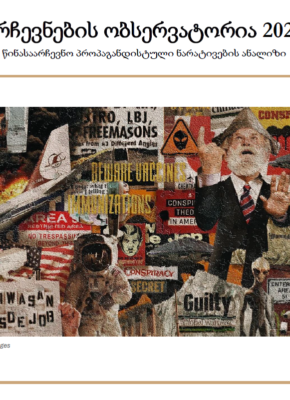 საქართველოს საარჩევნო ობსერვატორია 2024
საქართველოს საარჩევნო ობსერვატორია 2024
საქართველოს საარჩევნო ობსერვატორია (GEObserver 24) მოკლევადიანი ინიციატივაა, რომელიც მიზნად ისახავს 2024 წლის წინასაარჩევნო ნარატივების ფაქტ-ჩეკინგს. კლასიკური ფაქტ-ჩეკინგისგან განსხვავებით, ობსერვატორია არამხოლოდ ცალკეულ განცხადებებს ამოწმებს, არამედ მთლიან ნარატივს განიხილავს და მედია ანალიზთან ერთად, პოლიტიკურ ანალიზსაც გთავაზობთ. ობსერვატორია Fojo Media Institute-ის საგამოძიებო მედია ლაბისა (IML) და საქართველოს უნივერსიტეტის უსაფრთხოების, პოლიტიკისა და ნაციონალიზმის კვლევის ცენტრის (UGSPN) ერთობლივი პროექტია.
სტატიებში გამოთქმული მოსაზრებები, შესაძლოა, არ გამოხატავდეს ზემოთ ჩამოთვლილი ორგანიზაციების შეხედულებებს.
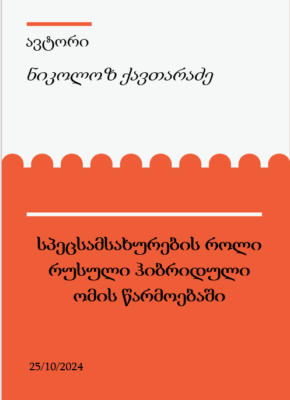 სპეცსამსახურების როლი რუსული ჰიბრიდული ომის წარმოებაში
სპეცსამსახურების როლი რუსული ჰიბრიდული ომის წარმოებაში
ავტორი: ნიკოლოზ ქავთარაძე
პუტინის მმართველობის პირობებში რუსეთმა გლობალურ ამოცანად დაისახა მსოფლიო ასპარეზზე ისეთ გავლენიან მოთამაშედ დაბრუნება (საბჭოთა კავშირის დროინდელი ძალაუფლების ნოსტალგიის ჭრილში), რომელიც დაასრულებდა დასავლურ ჰეგემონიას და წამყვან, შესაძლოა გადამწყვეტ როლსაც კი ითამაშებდა მრავალპოლუსიან მსოფლიო წესრიგში. ზემოხსენებული მიზნის მისაღწევად კრემლმა დასავლური ლიბერალური დემოკრატიის წინააღმდეგ „გლობალური“ ომის წარმოება დაიწყო. კრემლის გეგმით ასეთი ომის შედეგად ავტორიტარიზმმა დემოკრატიაზე უნდა გაიმარჯვოს, უნდა შეიკრას ავტორიტარული, არადემოკრატიული და ნაკლებად დემოკრატიული ქვეყნების ფორმალური თუ არაფორმალური ალიანსი და შესაბამისად შეიცვალოს სამართალზე დაფუძნებული საერთაშორისო წესრიგი.
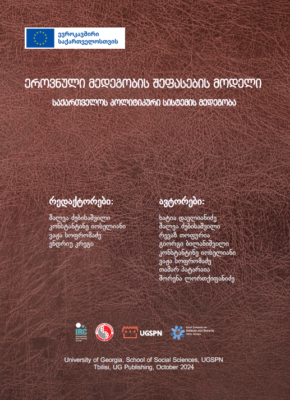 მედეგობის ინდექსი 2024
მედეგობის ინდექსი 2024
„მედეგობის/მოწყვლადობის შეფასების ინსტრუმენტის“ ანგარიშში, ამ პროექტის ფარგლებში შემუშავებული მედეგობის/მოწყვლადობის (R/VAT) მოდელის მეშვეობით შეფასებულია საქართველოს პოლიტიკური სისტემის და მისი ძირითადი აქტორების მედეგობის/მოწყვლადობის პოტენციალი რუსული მავნე ნარატივების გავრცელების საფრთხესთან მიმართებაში.
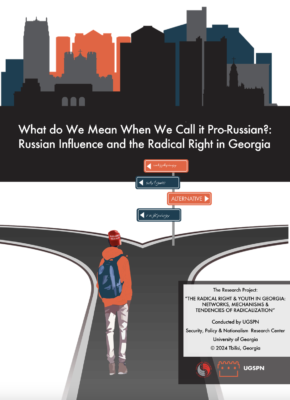 The Radical Right and Youth in Georgia: Networks, ...
The Radical Right and Youth in Georgia: Networks, ...
This research analyzes contemporary trends of radicalization within Georgia, with a specific focus on the
young adult demographic. Central to this study is the deconstruction of mobilization strategies employed by the radical right, understanding their appeal among young supporters, and illuminating the motivations behind their engagement with various radical-right discourses and groups. Additionally, the analysis unpacks the commonly attributed “pro-Russian” label associated with the Georgian far right and explain the nuances of this association.
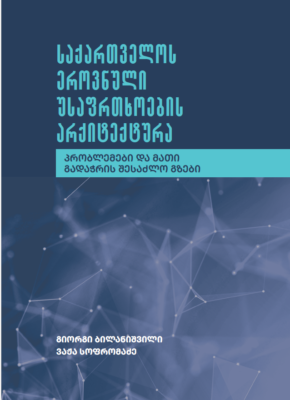 საქართველოს ეროვნული უსაფრთხოების არქიტექტურა პრობლემები და მათი გადაჭრის ...
საქართველოს ეროვნული უსაფრთხოების არქიტექტურა პრობლემები და მათი გადაჭრის ...
ვაჟა სოფრომაძე
გიორგი ბილანიშვილი
 What do We Mean When We Call it ...
What do We Mean When We Call it ...
While the Georgian radical right has been narratively labeled as pro-Russian almost since its widespread resurgence in recent years, this designation is still in need of deconstruction. Association with Russia is a multidimensional process, varying from value association to practical links and financial networks. While all of it could be considered contributive to the destruction of liberal democracy, the nuanced understanding of “pro-Russianness” within Georgia’s radical right is salient at least for the following reasons: it assists in identifying the core of the challenge and focusing solution-oriented discussion on the matter; moreover, it reflects on the indirect ways of influencing the youth’s ideological inclinations and positions on democratic values; and finally, it contributes to tailoring policy suggestions to the nuances of the issue.
The pro-Russian sentiments within certain political and non-governmental organizations in Georgia are evident, despite their reluctance to openly identify in this way. Following the conceptual framework, those entities falling under the pro-Russian category exhibit distinctive features such as a marked anti-Western stance, strong pro-Russian rhetoric, viewing the West as a primary threat, considering Russia a civilizational choice, and advocating for military neutrality or alignment with Russia. Their narratives, while fitting all four points of the pro-Russian type within Silagadze’s framework, extend further to underscore a shared perspective. This perspective emphasizes that dialogue with Russia stands as the sole pragmatic path forward, representing the cornerstone for addressing pressing issues, notably the resolution of the long-standing challenges posed by the occupied territories of Abkhazia and South Ossetia. While not explic- itly self-proclaimed as pro-Russian, their alignment becomes evident through an analysis of their discourse.
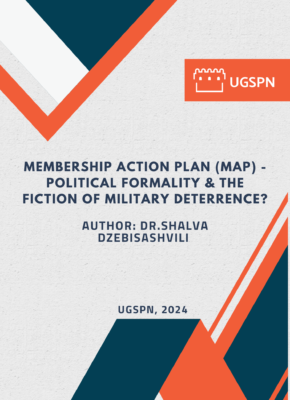 Membership Action Plan (MAP) – Political Formality & ...
Membership Action Plan (MAP) – Political Formality & ...
"If the political ends are vague or unspecified, how can you choose methods and means that are fit for purpose" - Colin Gray
Since the Bucharest summit declaration that promised the NATO-membership to Ukraine and Georgia, the option of the membership action plan (MAP) - formally the only mechanism for joining the alliance - became increasingly controversial, politicized and questionable, putting the credibility of the Alliance and its promises under the big question mark. The article doubles down on the debatable value of the MAP from the perspective of military deterrence and argues that the current version of the membership action plan does nothing whatsoever to increase the deterrent of a membership candidate, and in contrary, may lead to a much higher probability of military threat, i.e. aggression. Hence, the MAP appears to acquire a purely formal nature, with no practical applicability and military value to secure the membership process itself. Realizing this but not admitting it openly, the alliance is therefore trapped in its hesitance to decide on membership, thus effectively "donating" the veto right to a revisionist country that actively opposes the enlargement policy. The rapid inclusion of Finland and Sweden in NATO without formally activating the MAP-procedure, is reviewed as the vivid demonstration and testimony of the accuracy of arguments provided in the article.
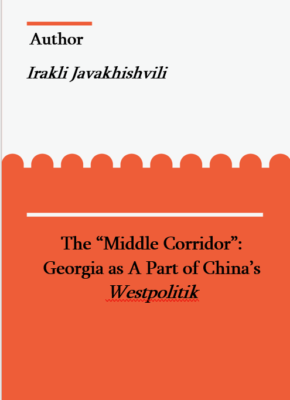 The “Middle Corridor”: Georgia as A Part of ...
The “Middle Corridor”: Georgia as A Part of ...
Author: Irakli Javakhishvili
The project of the “Middle Corridor” which is a component of China’s “grand strategy”, is an important instrument of Beijing’s Westpolitik. Georgia, in turn, has a significant place in this project, due to its favorable geopolitical location.Through the regions of Central Asia and the South Caucasus, China will create various land connections with the European Union, which will also serve as an alternative to the Russian route. This will be the shortest way from China to Romania – the “Middle Corridor”, which will pass through Central Asia, the Caspian Sea, the South Caucasus, and the Black Sea. In the same sense, the Anaklia deep-water port can become an essential node in the functioning of the Corridor, especially if its construction is carried out by a Chinese company (it will have not only an economic, but also a significant political weight). However, regardless of the possible economic benefits that Georgia may receive from the “Middle Corridor” project, including through the Anaklia port, such a shift in foreign policy priorities of Tbilisi may cause irreparable damage to the country’s aspirations to join the EU and, in general, completely alienate it from the Western democratic world. At the same time, the benefits of the Middle Corridor project will be much greater for China (in proportionality) than for Georgia, particularly in the light of the fact that Beijing often shows dishonesty in bilateral agreements and partnerships, and often applies economic and political leverage to the contracting party.
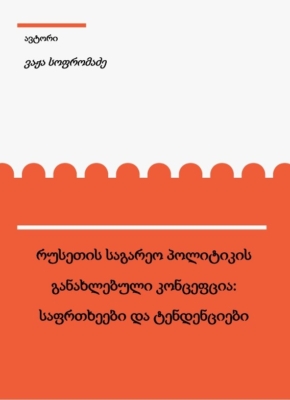 რუსეთის საგარეო პოლიტიკის განახლებული კონცეფცია: საფრთხეები და ტენდენციები
რუსეთის საგარეო პოლიტიკის განახლებული კონცეფცია: საფრთხეები და ტენდენციები
წარმოდგენილი სტატია აანალიზებს რუსეთის ფედერაციის საგარეო პოლიტიკის განახლებულ კონცეფციას და განიხილავს კრემლის მიერ გაცხადებულ მიზნებს და ამოცანებს საგარეო პოლიტიკურ განზომილებაში. განახლებული კონცეფციის მიხედვით კრემლს აქვს ამბიცია წამყვანი როლი ითამაშოს ახალი საერთაშორისო სისტემის ჩამოყალიბების პროცესში, სადაც გარანტირებულად დაცული იქნება რუსეთის სახელმწიფო ინტერესები.
დასავლური სახელმწიფოების მხრიდან უპრეცედენტო საერთაშორისო იზოლაციის ფონზე რუსეთის ფედერაცია ცდილობს გეოპოლიტიკური და გეოეკონომიკური ზიანის მინიმალიზაციას. საგარეო პოლიტიკური პოზიციონირების თვალსაზრისით კრემლი ცდილობს ანტიდასავლური და ანტიკოლონიალისტური დღის წესრიგის ჩამოყალიბებას და მის გაძლიერებას პოტენციურად მოწყვლად აზიის და აფრიკის რეგიონების სახელმწიფოებზე. გარდა ამისა, განახლებულ კონცეფციის მიხედვით, რუსეთი მზადაა გამოიყენოს შეიარაღებული ძალები საკუთარი მოკავშირეების და თანამოქალაქეების დასაცავად მთელი მსოფლიოს მასშტაბით.
იდეოლოგიური თვალსაზრისით დოკუმენტის განახლებული ვერსია სრულად ეფუძნება ე.წ. „რუსული სამყაროს“ კონცეფციას, რომლის მიხედვითაც რუსეთი საბოლოო ჯამში უნდა ჩამოყალიბდეს როგორც სახელმწიფო-ცივილიზაცია, რომელიც ხალხს რუსული იდენტობის ირგვლივ აერთიანებს.